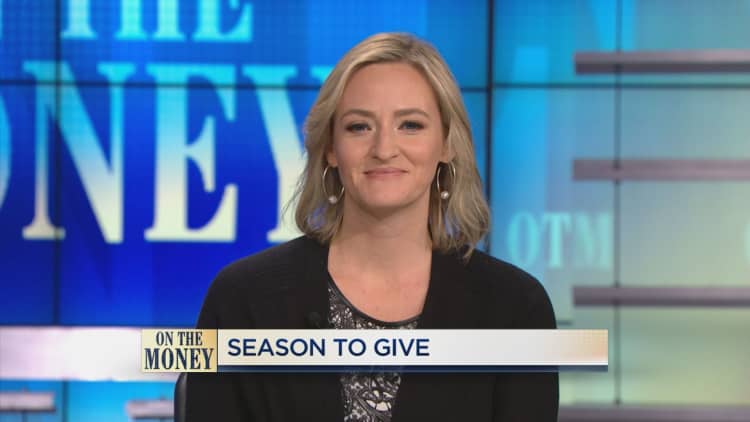Last year, Americans donated over $400 million online to charitable organizations during #GivingTuesday, the Tuesday after Thanksgiving when people are encouraged to stop shopping and start donating. Experts predict this year, the level of donations will exceed $500 million.
In fact, this unofficial holiday is popular among younger consumers, with about a quarter of millennials (those ages 23 to 38) and Gen-Z (those 22 and under) planning to participate in Giving Tuesday this year, which falls on December 3, according to Deloitte.
"Younger generations are taking the lead of this global generosity movement," says Asha Curran, CEO and co-founder of GivingTuesday. "While millennials are often counted out of philanthropic efforts because of lower financial contributions compared to older generations, they are in fact most likely to engage in Giving Tuesday."
But with 1.6 million nonprofits in the U.S., not to mention the millions of charitable campaigns, choosing where to donate can be challenging.
Here's three easy steps to take to ensure you're putting your donation to the best possible use this #GivingTuesday.
Investigate how the organization or campaign is set up
"Always do your due diligence," Ashley Post, a spokeswoman for Charity Navigator, tells CNBC Make It. Before making a donation, spend a few minutes reading up on the charity you're about to support.
The easiest way to verify a charity's legitimacy is to look it up on watchdog sites such as Charity Navigator, CharityWatch, BBB Wise Giving Alliance and Great Nonprofits. These sites rate nonprofits and allow you to find out more about the organization and how donations are spent.
Of course not every charity is going to have a rating, usually because they are either too small or too new. Or perhaps you're looking to give to a campaign on GoFundMe or other crowdfunding options. If that's the case, you should have a clear understanding of who is running the campaign, where the donations are going and how the money will be used.
GoFundMe has a team that works to verify each campaign and ensure the funds get to the intended recipient. If the funds are not delivered, GoFundMe offers a donor protection guarantee.
Even a simple Google search can also be helpful in showing any positive or negative press about an organization. When you're considering a specific charity, search its name plus the words "complaint," "review," "rating," or "scam," the Federal Trade Commission recommends.
"You don't need to do hours' worth of research to feel confident giving," Post says. "A quick review of the information and resources available to you will give a sense of whether a charity is legitimate, in line with your values and worthy of your support."
Avoid organizations that want gift cards or wire transfers
If a charity or nonprofit is seeking donations in the form of gift cards or wire transfers, avoid it. "That's how scammers ask you to pay," the FTC advises.
Instead, make your donations using your credit card. The Fair Credit Billing Act makes it so consumers are only liable for up to $50 in fraudulent charges on a credit card. And major credit card companies, including American Express, Discover, Mastercard and Visa offer "zero liability" policies, so you don't have to pay for any fraud.
Make sure to keep track of your donations and review your credit card statement closely to ensure that you're only charged the amount you agreed to donate – and that you have not been signed up for recurring payments.
You should also prioritize organizations that limit processing fees and allow you to make donations directly. That's because some third-party payment processors will charge the charity fees and donation platform costs. PayPal, for example, charges a fixed fee of $0.30, plus 2.2% per transaction.
Know where are your dollars going
Beyond making sure that the charity you're considering is legitimate, take some time to browse the organization's website to learn more about how they're tackling their goals and what they've learned along the way, Post recommends.
Charities' annual reports are a great source of this information. Or if you don't want to dig through the organization's disclosures, the newly launched site ImpactMatters has impact ratings for over 1,000 charities and gives you an idea how much your dollars can do.
For example, a $50 donation to the Eden Reforestation Projects offsets 7 years of individual carbon emissions. That same $50 donation could also provide 100 people with a year's worth of clean water in Africa through the nonprofit Evidence Action, according to ImpactMatters.
"Think about your donation like an investment in the work the charity is doing," Post says. That means following up and asking questions. What has the organization learned? Where are they going? What new needs do they have?
"Organizations benefit tremendously from having loyal donors who are interested in their work and continue their support year after year," Post says.
Don't miss: Only 1.6% of Americans' charitable giving goes toward nonprofits helping women and girls
Like this story? Subscribe to CNBC Make It on YouTube!



